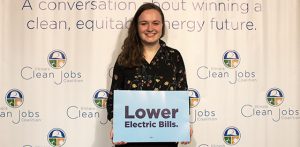 A long-awaited ruling by the Federal Energy Regulatory Commission to reward dirty power generators and raise consumers’ power bills has been delayed until at least Nov. 29, and possibly 2020.
A long-awaited ruling by the Federal Energy Regulatory Commission to reward dirty power generators and raise consumers’ power bills has been delayed until at least Nov. 29, and possibly 2020.
But while the ruling may be delayed, the need to protect Illinois consumers from bloated bills is not. The General Assembly must pass the Clean Energy Jobs Act (CEJA) in the fall veto session to have capacity reform protections in place before next year’s capacity auction.
CUB expected the Federal Energy Regulatory Commission in September to revamp PJM capacity market rules in a way that would privilege dirty power generators at the expense of northern Illinois consumers.
But an ethics ruling forced the one FERC Commissioner who may have sided with consumers to recuse himself, leaving FERC without a quorum to make the ruling official.
Commissioner Richard Glick expected to avoid FERC cases involving his former employer Iberdrola USA (now Avangrid) for two years after his last day of employment at Avangrid, ending his recusal period in February 2018.
However, this month, the Designated Agency Ethics Official (DAEO) said the recusal is actually effective two years after beginning work as a federal employee. That means he has to recuse himself from the PJM capacity case until Nov. 29, 2019.
Consumer advocates pushed to protect consumers from the consequences of the FERC decision (an estimated $864 million a year in higher power bills) by passing capacity market reforms as part of the Clean Energy Jobs Act.
It is likely that PJM will want to hold a capacity auction early next year (as early as May 2020). We need adequate time to implement capacity reform in Illinois—so it is vital we pass CEJA in the fall veto session in October and November of this year.

